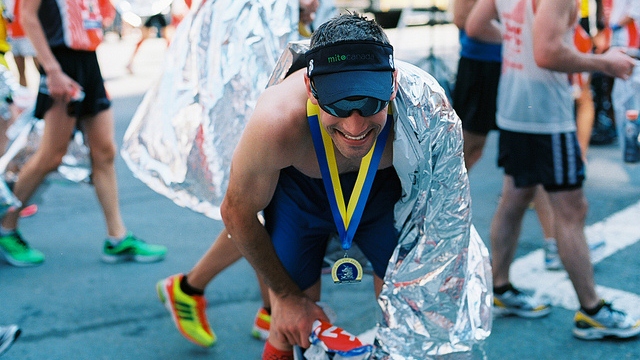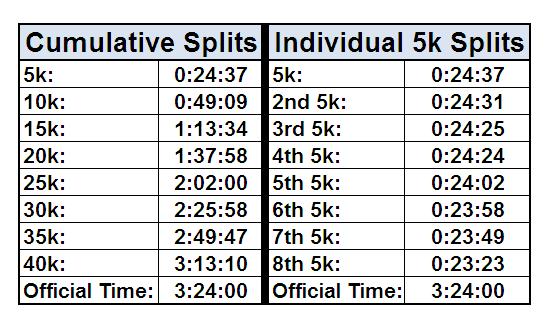At the 2012 Boston Marathon, runners faced an even more daunting challenge than Heartbreak Hill: a scorching temperature of 88 degrees with unseasonably high humidity.

Racing a marathon in the heat is difficult. In fact, after race organizers recommended only the fittest runners start the race, 16% of registered runners decided not to compete on April 16.
That’s huge considering Boston is practically the Holy Grail of marathons. Who wants to abandon the world’s greatest marathon?
Today I want to tell the story of Terry, a runner I coached to break three hours at Boston. He didn’t even come close – but he still considers his Boston Marathon performance a victory.
Taking the Plunge
Before I worked with Terry, he was already a successful runner by most measures. He had qualified for Boston with a 3:07 marathon and boasted an 18:47 5k PR (or a 6 minutes per mile average).
He trained hard, loved the pursuit of a worthy goal, and even used cross training to boost his performances. His training was also pretty damn good: 40-50 miles per week, consistent racing, and most importantly the mentality of a runner looking to improve.
But Terry wondered if there was more to smart training than just running hard. He says:
“I felt I needed the support, direction and encouragement of a coach to reach my full potential. I had been very successful at improving my times but was at a point where I needed a more aggressive training plan that included more than just running, like strength and stretching (both of which I don’t like to do).”
So he made the leap and signed up for my 1-on-1 coaching program. I knew from our conversation and his Questionnaire that he was passionate about running and becoming a better runner (the two qualities I want before I allow a runner to work with me).
At first Terry was hesitant about investing in himself by hiring a coach. After all, he’s a married man with a career and a coach is just for pros, right?
No way! Terry said “I felt coaching would help me achieve a new level of fitness and lower my times. Six months later, I’m now a better and faster runner!”
Making Terry a Stronger Runner
Since Terry had already achieved several significant personal bests, I knew that he needed to take the next logical step in his training. First, I had him gradually increase his overall mileage. When we got into his specific marathon training his workouts became longer and more challenging. He remembered:
“The change in training wasn’t significant at first but as my target race got closer, the miles and level of effort increased over my previous training. Although the workouts were only about 10 miles per week more than what I was already doing, the intensity of the workouts increased significantly.”
New training can be exciting, but it’s also uncharted territory for many runners. When was the last time you varied your routine, ran new workouts, or bumped your mileage higher than what you’re used to running?
Terry recalls: “A challenge for me was accepting that I was doing something different and trusting the workouts. The old way had worked well for me, I had to trust this would produce even better results.”
Less than two months after working with me, he ran a low-key marathon to gauge his fitness and see how he was doing. With no specific preparation or goal to run fast, Terry ran 3:04 for a PR of about three minutes. His recovery went well and soon he was back at his marathon training.
Despite the additional mileage and intense workouts, he avoided any major injuries throughout his preparation. When he came to Washington, DC for a conference I met him early one morning for a run through Rock Creek Park. In the midst of his peak marathon prep about a month before Boston, I could tell he was tired.
Full disclosure: I was eager to show him the trails of the park and brought him on way too many hills. Sorry Terry!
Nobody feels peppy or energized during the entirety of a marathon training cycle. It’s just impossible. But at the end, his fitness was significantly higher than when we started together.
Racing Boston: Duel in the Sun
With news of the weather looking more dismal by the day, we reworked our race strategy to accommodate the heat. The option of deferring was available but Terry was eager to experience the Boston Marathon, even though he told me that “I do not do well in the heat and humidity…I’ve fought it, tried to beat it and the heat always wins.”
Going into the race, Terry was in better shape than ever before. He had pushed himself harder during this training cycle and was ready to test his fitness.
I got his race number and tracked each of his splits as he ran from Hopkinton to Boylston Street on that hot Monday morning. With his goal of sub-3:00 too aggressive for such a warm day, I told him to start conservatively and run by feel during the later miles.
As his splits started coming in, I knew that Terry wasn’t going to break that elusive 3-hour barrier. With a 24:37 opening 5k, I thought he would run about 3:35 or slower if he faded in the heat (which, I thought, was guaranteed).
Instead, Terry surprised the hell out of me by crushing every 5k faster than the one before it. Take a look at these splits:

Wow! I was literally pumping my fist at my computer when the official time was recorded. Congratulations Terry!
4 Vital Lessons from Racing Boston and Having a Coach
Obviously Terry was disappointed that the weather in Boston was terrible for running a fast race. But overall, he was pleased with his race. He said:
Although I didn’t get the sub-3 because of the weather, I felt my race was good and I was able to run negative splits. Previously in hot races, I had done very poorly and “bonked”…I did not bonk in Boston and finished strong; that was a victory. I ran another hot race three weeks later and finished strong there as well.
Running well in the heat requires a willingness to suffer and Terry put on a great display of his toughness at the Boston Marathon. There’s interesting evidence that implies the brain is largely in control of you slowing down on a hot day. In other words, it’s not the heat – it’s your brain protecting you.
You’ll also run a little easier in the heat with better training. If you’re in great shape, you won’t suffer as much. Luckily Terry was in the best shape of his life when he lined up in Hopkinton.
After six months of working together and racing a marathon in 85+ degree temperatures, what did Terry learn? Here are his top 4 lessons, in his own words:
- Trust the training and have faith it’s going to work…it will.
- I had always been told that long runs should be about finishing and time on your feet. Not really! You still need to push yourself and give a strong effort… you should not be out for a jog.
- Push yourself and it will pay off.
- There is always something you can do to improve if you are willing to put in the time and effort.
Well put.
I asked Terry to share any final thoughts on his time training with me and reaching his big goals. What did he think? Would he do it again? What type of runner benefits from coaching? Here it is:
I would recommend Jason’s services to anyone with a similar situation: you have been successful and got to a point where you can put up steady results but need the boost and oversight to go further. He is good at using your input to design a program and providing honest feedback; even when it’s not what you want to hear. Ultimately, it is up to you to follow his training and advice, but Jason will be put you in a place to be successful.
Thank you to Terry for sharing his experiences and impressive race results at the 2012 Boston Marathon. It wasn’t an easy day for anyone and you often have to make the best out of imperfect conditions.
Are you training for a marathon? Learn more about a custom race plan or Run Your BQ, a marathon training community that I coach.